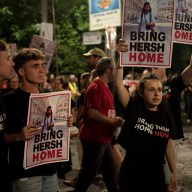By Jonathan Stempel
NEW YORK (Reuters) – A U.S. judge denied bail on Thursday to a wealthy Turkish gold trader on charges he conspired to violate U.S. sanctions against Iran, rejecting the defendant’s controversial proposal to hire his own guards to ensure he didn’t flee the country. U.S. District Judge Richard Berman in Manhattan said prosecutors showed it was more likely than not that Reza Zarrab posed a flight risk if freed from federal custody, and might not show up at trial. Zarrab, 33, has been in custody since his arrest on March 21 in Miami while en route to Disney World with his wife and daughter.
Zarrab had sought to be released on $50 million bond and be held in a 15th-floor Manhattan apartment under 24-hour watch by armed guards at his own expense.
But the judge said the Iranian-born Zarrab, a dual national of Iran and Turkey, had significant financial resources, no U.S. ties, and strong ties to countries that would not extradite him if requested. Those factors “provide Mr. Zarrab with the incentive and the wherewithal to flee and render him a flight risk,” Berman said.
Zarrab’s lawyer Benjamin Brafman said his client may appeal.
“We are deeply disappointed by Judge Berman’s decision, but are intent on continuing to vigorously defend Mr. Zarrab who we believe to be innocent,” Brafman said in a statement.
A spokeswoman for Preet Bharara, U.S. Attorney for the Southern District of New York, declined to comment.
Prosecutors said Zarrab and two others engaged in hundreds of millions of dollars of transactions on behalf of Iran’s government and Iranian entities from 2010 to 2015 in a scheme to evade U.S. sanctions. The case has drawn much attention in Turkey, where Zarrab was arrested in 2013 in a corruption probe into individuals with close ties to Tayyip Erdogan, then Turkey’s prime minister and now its president. It has also drawn scrutiny in the United States over whether the criminal justice system should treat the wealthy better than the poor, who lack the resources to self-finance their living conditions prior to trial. Individuals who were allowed to live under house arrest with private guards included Ponzi schemer Bernard Madoff, Macau billionaire Ng Lap Seng and New York lawyer Marc Dreier.
Zarrab will not be among them.
“The defendant’s privately funded armed guard proposal is unreasonable because it helps to foster inequity and unequal treatment in favor of a very small cohort of criminal defendants who are extremely wealthy, such as Mr. Zarrab,” Berman wrote. The case is U.S. v. Zarrab, U.S. District Court, Southern District of New York, No. 15-cr-00867.
(Editing by Frances Kerry and Jeffrey Benkoe)


















